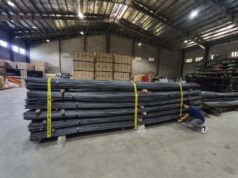MANILA – Citing concerns that it may conflict with existing laws and adversely impact the government’s fiscal position, President Ferdinand R. Marcos Jr. has vetoed a bill seeking to amend the charter of the Bases Conversion and Development Authority (BCDA).
While Marcos Jr. said he recognized Congress’ noble intention in crafting the bill, he said he could not ignore the concerns raised by the national agencies.
In his veto message dated April 24, and transmitted to both Houses of Congress, the president noted several issues with the enrolled bill, including the proposed increase of P100 billion in authorized capital, which he said could affect the government’s fiscal integrity.
He said that the proposal to use the proceeds from the sale of the allocated lands from the ecozones to accrue mainly to the BCDA is inconsistent with the government’s one-fund policy, limiting its fiscal flexibility in deciding fund utilization for more pressing concerns.
“In addition, the bill antithetically grants to the BCDA the authority to determine alienable and disposable lands, which clearly falls under the mandate of the Department of Environment and Natural Resources,” Marcos Jr. said.
At the same time, he said the bill’s language granting land ownership and authority to the BCDA in disposing of lands contradicts Republic v. Heirs of Bernabe, which provides that the state is the beneficial owner of the lands transferred to the BCDA by virtue of Republic Act No. 7227.
Inclusive communities
The proposed amendments to RA 7227 as encapsulated in House Bill 8505 and Senate Bill 2647 had earlier received the support of several business groups based in Central Luzon citing the measure’s role in creating more inclusive communities and in spurring economic growth in the region and the country.
SB No. 2647 was seen to give workers access to affordable housing, accelerate infrastructure development, further drive investments in the country, and support the pension fund of the Armed Forces of the Philippines.
Under the bill, a certain percentage of the land area of each BCDA economic zone shall be declared as alienable and disposable, authorizing its sale for residential use, mixed use, industrial, and institutional purposes.
“With our properties, such as Clark, John Hay, Poro Point, and Morong Discovery Park on the cusp of economic transformation, we urgently need to overcome legislative challenges that may hinder the optimum potential of these economic zones. More importantly, we seek to empower the workforce that drives the success of these business hubs by allocating a portion of our land for residential purposes.” So enthused BCDA president and CEO Joshua Bingcang then.
If passed, the bill is seen to mobilize residential and affordable housing development in BCDA ecozones, which is currently prevented by the leasehold status of the properties.
“This would benefit workers who usually need to live and commute outside the BCDA ecozones, providing them convenience and affording them the opportunity to own a property that they can pass down to their children or family members,” the BCDA said in a statement at the time.
Exclusive enclaves
On the contrary, groups opposed to the BCDA charter amendments, notably advocates of indigenous peoples’ rights had expressed fears that opening the former base lands to private ownership would “redound to exclusive enclaves of the rich and powerful to the utter loss of the nation’s patrimony.”
The group cited a press statement of the BCDA itself that said the proposed amendments “also met tremendous support from the BCDA’s partners, including Ayala Corp., Megaworld Corp., Filinvest Land Inc…” which they said are “all big-time developers.”
The bill which also seeks to extend the BCDA’s corporate term by another 50 years from its current remaining corporate life of 18 years, is “much-too-much leeway for a government corporation that had long achieved its level of incompetence,” a member of the group said.
As referenced by the Peter Pinciple, “level of incompetence” is that point at which corporate abilities are no longer sufficient to perform the tasks expected of them in a given role or context. Punto News Team/PCO-PR





